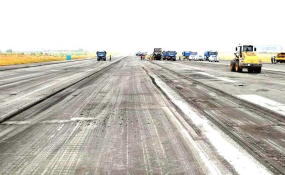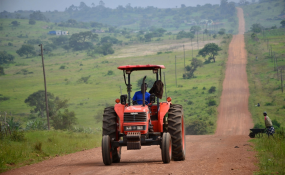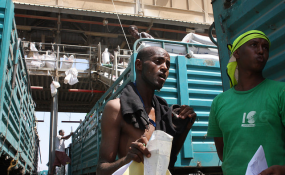South Sudan’s government is spending oil revenue on weapons as the country descends into a famine largely caused by President Salva Kiir’s military campaign, a confidential UN report says.
The report obtained by this reporter on Friday calls for an arms embargo on South Sudan — a measure that has been backed by the United States but was rejected by the Security Council during a vote in December.
“Weapons continue to flow into South Sudan from diverse sources, often with the coordination of neighbouring countries,” said the report by a UN panel of experts.
The experts found a “preponderance of evidence (that) shows continued procurement of weapons by the leadership in Juba” for the army, the security services, militias and other “associated forces.”
South Sudan derives 97 percent of its budget revenue from forward sales of oil. From late March to late October 2016, oil revenues totalled about $243 million, according to calculations from the panel.
At least half — “and likely substantially more” — of its budget expenditures are devoted to security including arms purchases, the 48-page report said.
The government continued to sign arms deals as a famine was declared in Unity State, where 100,000 people are dying of starvation and a further one million people are near starvation.
“The bulk of evidence suggests that the famine in Unity State has resulted from protracted conflict and, in particular, the cumulative toll of repeated military operations undertaken by the government in southern Unity beginning in 2014,” said the report.
The government is blocking access for humanitarian aid workers, compounding the food crisis, while significant population displacement is also contributing to the famine.
An upsurge in fighting since July has devastated food production in areas that had been stable for farmers, such as the Equatoria region, considered the country’s breadbasket.
The total number of South Sudanese facing famine could rise to 5.5 million in July if nothing is done to address the food crisis, the experts said.
Weapons pour in
The report was released ahead of a special Security Council meeting on South Sudan on Thursday that will be chaired by British Foreign Secretary Boris Johnson.
The meeting could once again revive calls for an arms embargo, which was rejected despite warnings from the United Nations of a risk of genocide in South Sudan.
While the previous US administration pushed for a ban on weapons sales, President Donald Trump’s government has yet to make clear its stance on ending one of Africa’s worst conflicts.
Borders with Sudan and Uganda continue to be key entry points for weapons supplies to South Sudanese forces and some shipments are also entering from the Democratic Republic of Congo, according to the report.
The panel cited information from high-ranking South Sudanese military and intelligence officers that Egypt had shipped military equipment, small arms, ammunition and armoured vehicles to South Sudan over the past year.
Experts are investigating the delivery this year of two L39 jets from Ukraine that were sold to Uganda, but may have ended up in South Sudan, as well as a contract with a Seychelles-based company for a very large quantity of armaments.
In comparison, opposition forces have received limited supplies of light weapons ammunition, the report said.
After gaining independence from Sudan in 2011, South Sudan descended into war in December 2013, leaving tens of thousands dead and 3.5 million people displaced.
The United Nations is pushing regional leaders to exert pressure on Juba to end the violence that has turned tribal, pitting Kiir’s Dinka community against ethnic Nuer, Shilluk and other groups.








